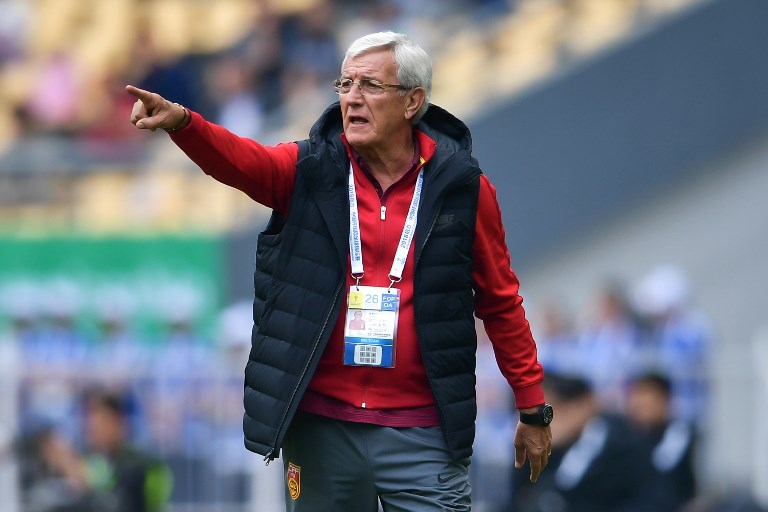
China’s head coach Marcello Lippi gestures during the China Cup International Football Championship third-place playoff match between China and the Czech Republic in Nanning in China’s southern Guangxi region on March 26, 2018. / AFP PHOTO / – / China OUT
China is throwing money at President Xi Jinping’s ambitions to boast a top-class national football team and one day host a World Cup.
But while the latter can be achieved by splashing the cash, the former appears further away than ever after a desperate four days.
China’s national team have long been an embarrassment to the country and on Friday, Marcello Lippi’s side lost 1-0 to Qatar in Doha, triggering another bout of soul-searching and finger-pointing by Chinese media and fans.
Titan Sports, citing “informed sources”, said that an apoplectic “high-ranking official” got on the phone to a team supervisor at the Khalifa Stadium before half-time to demand what was going on.
Lippi, said to be the best-paid international coach in the world on reported wages of between $23 million and $27 million a year, admitted he was shocked by the team’s performance in Qatar.
That was followed on Monday by a moribund 0-0 draw with Bahrain, who is ranked 113th in the FIFA rankings to China’s 75th, prompting Lippi to say that he was “mentally prepared for criticism”.
Some incandescent fans on Weibo, China’s equivalent of Twitter, called for the national team to be disbanded.
The 70-year-old Lippi, who is expected to step down after the Asian Cup in the UAE in January, said he had been “surprised and worried about the condition of our players” before the Qatar game.
“If the Asian Cup opened next week, I’d be worried, but we still have time to become better,” added Lippi, who led his native Italy to win the World Cup in 2006.
Big money, little return
China improved when Lippi took over nearly two years ago, but that initial bounce is gone. In his 21 games in charge they have won eight, lost eight and drawn five.
They failed to reach the World Cup in Russia — in Lippi’s defense, most of the damage to China’s qualifying hopes was done before he arrived — and he is under pressure for the first time.
Lippi’s side had plenty of the ball against World Cup 2022 hosts Qatar but lacked a cutting edge up front, where Chinese Super League (CSL) top-scorer Wu Lei had little support or service.
Lippi has previously bemoaned his lack of strikers, saying it was because CSL teams tended to favor expensive foreign forwards, limiting chances for Chinese players.
On Monday, the Chinese Football Association announced that another well-known coach, the 71-year-old Guus Hiddink, will take over the under-21 side — another statement of intent.
The Dutchman will earn just under four million euros a year after tax, local media said, which is more than England manager Gareth Southgate.
With Lippi and now Hiddink, China boasts two top coaches, albeit ones that are nearing the ends of their careers.
‘Chronic illness’
But there is widespread acknowledgement that China does not have the players to compete even with Asia’s best.
The average age of Lippi’s starting line-up against Qatar was 30, underlining the dearth of young talent.
“Speaking with no exaggeration, Lippi’s national team is truly standing at a crossroads,” journalist Bai Guohua wrote in the Soccer News newspaper.
Bai said that the inclusion of the 38-year-old midfielder Zheng Zhi “reflects the frustrating reality of Chinese football -– if the younger players could take over quickly, don’t you think Lippi would be willing to bring in more youngsters?”
As part of President Xi’s football drive, youth academies and pitches are springing up in China, but it is expected to take several years before they begin to bear fruit.
China has only reached the World Cup finals once, in 2002, when they failed to win a point or score a goal.
Bai lamented that “it feels like we are far from one step away from the World Cup”.
“This is not a unique problem for Lippi’s national team, but a chronic illness of the Chinese football team.”